Ensuring Resilient Community-based HIV Services During the COVID-19 Pandemic
On March 16, 2020, Tanzania’s Ministry of Health, Community Development, Gender, Elders and Children (MOHCDGEC) announced the first confirmed case of COVID-19 in the country. Over the following months, the COVID-19 pandemic disrupted Tanzanian society and institutions, including the healthcare system. CDC, in collaboration with ICAP and MOHCDGEC, rapidly organized and implemented a plan to ensure continuity of HIV services and the safety of healthcare workers and clients.
With support from the U.S. President’s Emergency Plan for AIDS Relief (PEPFAR), CDC, and its implementing partner, ICAP, served pivotal roles in supporting essential HIV-related services in community settings, including testing and treatment for HIV. Once the first case of COVID-19 was reported in Tanzania, CDC, ICAP, and MOHCDGEC worked together to strengthen the resiliency of HIV services. Top priorities included:
- reducing the time spent in healthcare facilities while maintaining a client-centered HIV service delivery approach,
- implementing modified infection prevention and control (IPC) measures to reduce the likelihood of COVID-19 transmission,
- continuing efforts to identify new cases of HIV while avoiding in-person gatherings, and
- implementing virtual monitoring and evaluation strategies.
The challenges of the COVID-19 outbreak highlighted several important lessons for HIV programs in the future. During an unprecedented public health emergency, HIV programs remained resilient through a combination of innovation and flexibility. CDC, ICAP, and MOHCDGEC maintained essential HIV services while keeping clients, healthcare workers, and communities safe. This was achieved through a combination of rapid scale up of established interventions, as well as, the use of novel strategies that had not been attempted in Tanzania.
Scaling up HIV treatment services in communities
Community-based antiretroviral therapy (ART) is an essential activity for client-centered HIV service delivery. Through remote technical assistance and support provided by CDC, ICAP provided multi-month HIV prescriptions to stable clients in a safe, confidential, and accessible community space. This approach kept clients on treatment and reduced their need to visit healthcare facilities. ICAP began implementation of community-based ART refill services in September 2019 and continued to scale-up coverage to additional sites through March 2020. This laid the groundwork for CDC to leverage and scale up community ART services as soon as the first case of COVID-19 was confirmed. The ability to act quickly was essential in ensuring the continuity of lifesaving ART while facilities were adapting to new COVID-19 safety protocols.
When the first COVID-19 cases were diagnosed in Tanzania, it became apparent that an added benefit of community-based ART was less crowded healthcare facilities. Fewer people in healthcare facilities reduced the risk of COVID-19 exposure for both clients and healthcare providers. To expand this benefit in the time of COVID-19, community ART refill services were rapidly expanded in the regions of Dar es Salaam, Mwanza, Geita, and Kagera. Community-based ART was more convenient and had potential to save lives.
Innovative forms of transportation were used to provide HIV treatment and services to clients in hard-to-reach areas. Small 3-wheeled taxis (locally known as bajajis), motorbikes, and other vehicles served as mobile pharmacies for healthcare staff to visit specific locations within communities to provide HIV treatment services. Boats were used to provide treatment services for remote communities on the islands of Lake Victoria. From October to December 2019, ICAP provided community ART for 3,506 individuals. That number increased more than twelve times from April to June 2020 when ICAP provided ART to 42,819 additional clients. ICAP was on target to provide community ART to 100,000 clients before October 1, 2020.
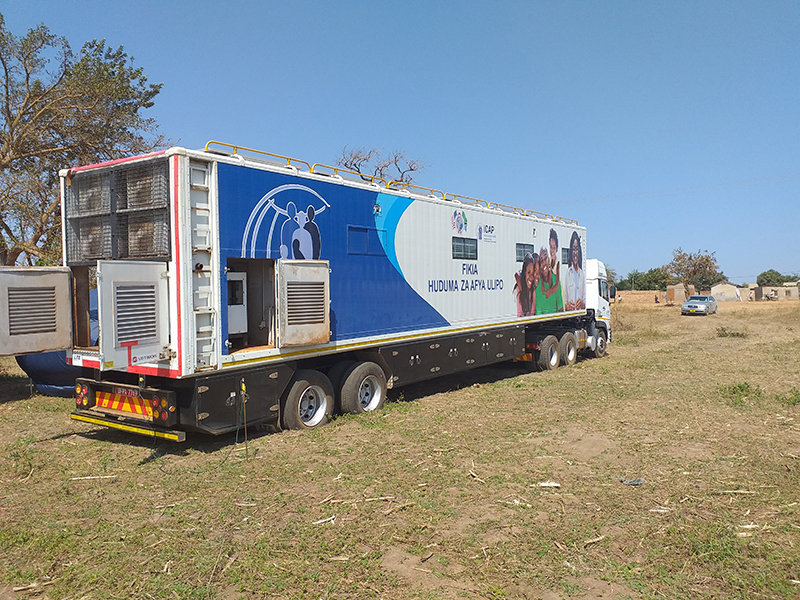
Mobile clinic used to provide essential HIV services for community members in remote areas of Tanzania
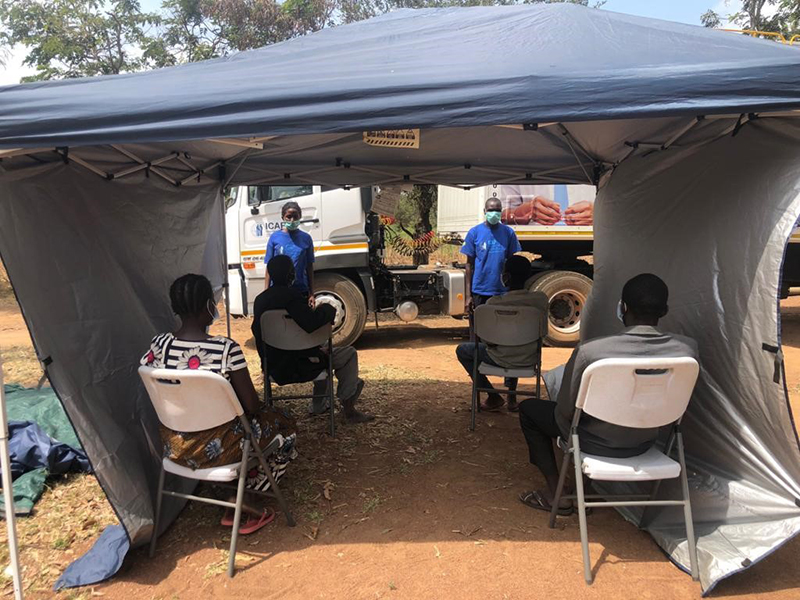
Client waiting area in a tent outside of mobile HIV clinic in Tanzania.
Enhancing infection prevention and control measures
As community-based ART was scaled up, it was critical to ensure that safe IPC measures were followed. On-the-job training and information on best IPC practices were provided to volunteers, staff, and healthcare workers. Field teams closely monitored and reported on the adherence to IPC measures.
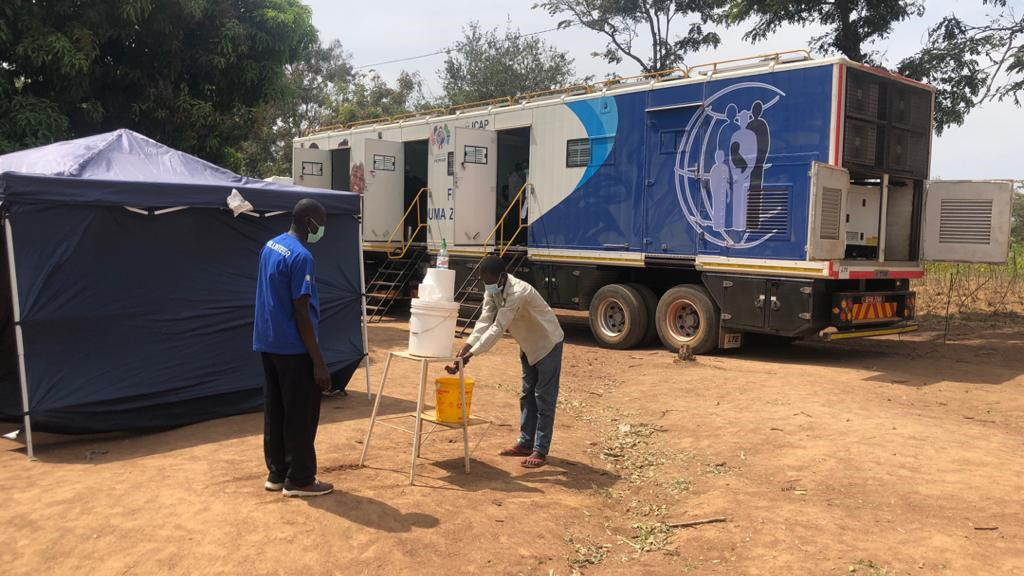
IPC station outside of a mobile clinic in Tanzania.
Leveraging technology to deliver HIV services during COVID-19
With the threat of COVID-19 in Tanzania, all in-person HIV program activities such as meetings, trainings, orientations, and technical support, were halted and moved to virtual and digital platforms to ensure continuity of services. This approach proved to be particularly important for those services tailored to disproportionately affected populations such as adolescent girls and young women through the PEPFAR-supported Determined, Resilient, Empowered, AIDS-free, Mentored and Safe (DREAMS) initiative. DREAMS facilitators embraced the use of technology, including social media chat groups, online audio and web conferencing, and phone calls to schedule appointments, maintain outreach activities, and continue support groups. Different technology and digital platforms were used to provide HIV self-testing kits and pre-exposure prophylaxis to high-risk groups, as well as to perform virtual monitoring and evaluation of programs.
Finding innovative approaches to provide testing for key and disproportionately affected populations
Through CDC support, ICAP uses various mobile outreach strategies to reach key and disproportionately affected populations. These outreach efforts included targeted, mobile HIV testing activities and community events that involved gathering dozens to hundreds of individuals, including sexual contacts of clients.
To stop and slow the spread of COVID-19 within the communities they serve, ICAP suspended large in-person events intended for HIV case identification, and moved to innovative approaches such as self-testing and social network testing strategies. Social network testing involves engaging networks of sexual and injection drug use partners of clients living with HIV and ends the need for large in-person gatherings. Distributing HIV self-testing kits minimizes the risk of COVID-19 transmission for both outreach teams and clients, while maintaining efforts to identify and diagnose new clients living with HIV. Both HIV self-testing and social network testing are examples of innovative interventions that were already planned for scale-up, but moved more quickly because of necessary safety demands of the COVID-19 pandemic.
With CDC support, ICAP used a peer-led model with bajajis, outreach vans, and motorbikes to distribute HIV self-testing kits to sexual or injection drug use contacts. The distribution of HIV self-testing kits increased more than ten-fold from 898 in April 2020 to 11,979 by July 2020. Additionally, the number of people diagnosed with HIV through self-testing services increased from 72 in April 2020 to 1,215 by July 2020.
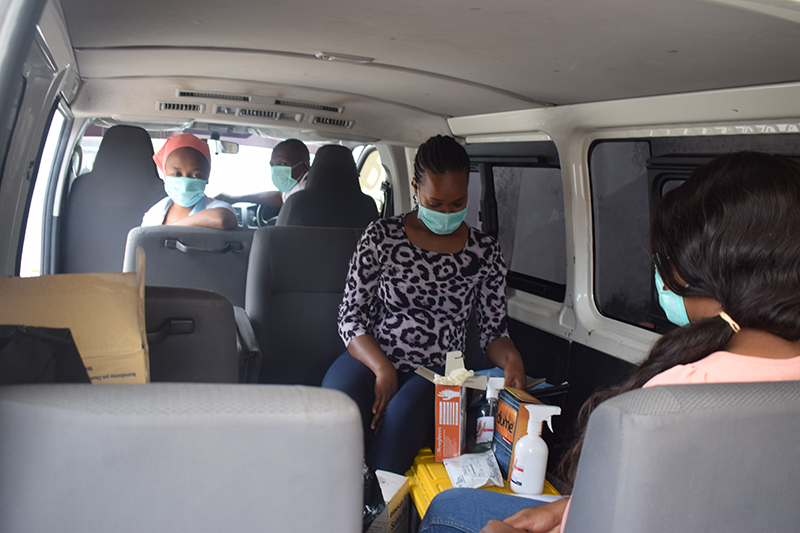
ICAP peer counsellor conducts an HIV prevention session and provides an HIV self-testing kit to a client inside a mobile testing van.
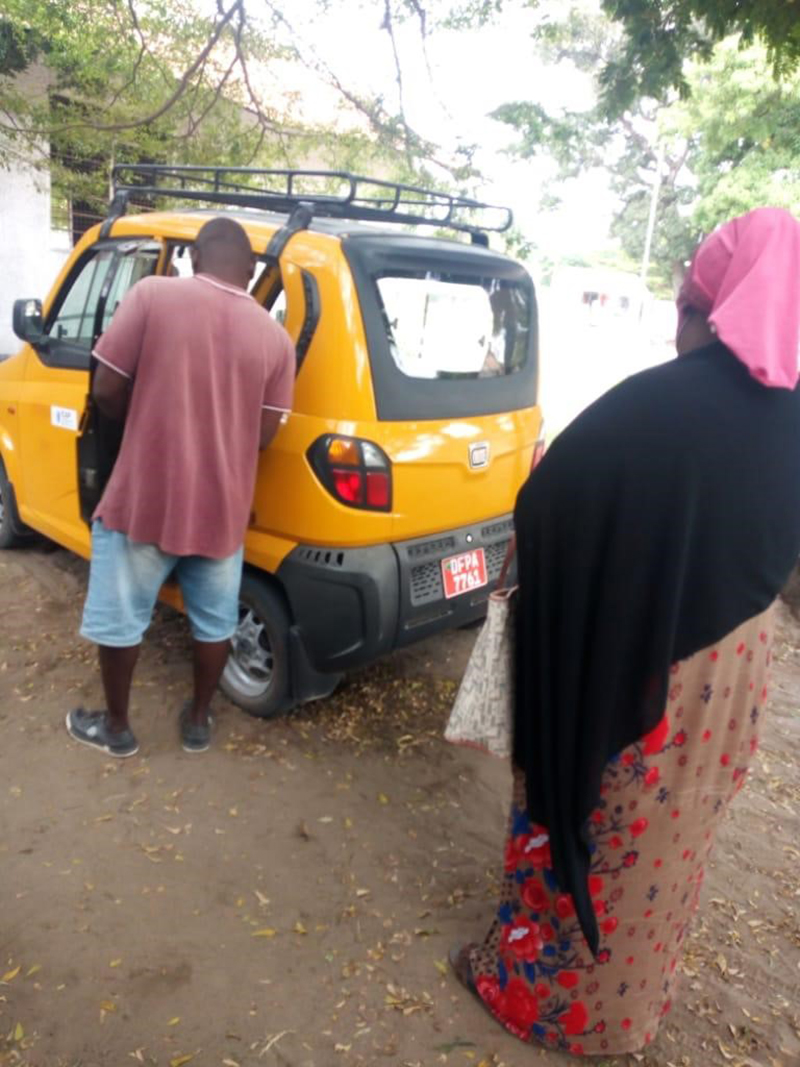
A couple visiting a mobile pharmacy to collect HIV self-testing kits.
Navigating challenges and lessons learned
Lessons learned during the COVID-19 pandemic will continue to be implemented as best practices in client-centered care moving forward. Community-based ART, HIV self-testing, and use of social network approaches to identify key and vulnerable populations will now be integrated into the standard program package offered throughout Tanzania. Use of virtual platforms has proven invaluable and will increasingly be a key component of program planning, not only because of the benefits for health and safety, but also the potential for advances in efficiency and cost-savings. IPC measures at healthcare facilities will also be critical, not only for COVID-19 control, but also for preventing the spread of tuberculosis (TB) and other infectious diseases that can be transmitted in a healthcare facility setting.
Most importantly, the COVID-19 crisis further strengthened coordination and collaboration between key public health stakeholders. Ensuring resilient HIV service delivery would not have been possible without commitment, dedication, and partnership between ICAP, CDC, MOHCDGEC, regional health management teams, community leaders and, most importantly, community members. The renewed strength of these partnerships will be a cornerstone of future public health response – to HIV, COVID-19, and beyond.